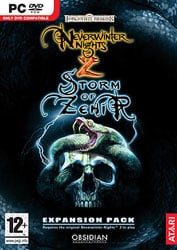
Players:1-4
Price:$29.99
Platform(s): PC
Developer:Obsidian Entertainment
Publisher:Atari
ESRB:Teen
Website:www.atari.com/nwn2/soz
Your Daily Blend of Entertainment News
Rating:

Storm of Zehir is perhaps the final expansion to Neverwinter Nights 2 but there's nothing valedictory about it. It's more of an introduction than a conclusion really, with broad new gameplay features and a story that serves as a prelude to a much larger tale in Dungeon & Dragon's Forgotten Realms setting. While it's heartening to know that Obsidian has future plans for the series and that they're willing to make bold changes to the series' formula, SoZ's innovation has a price and many of the NWN2's previous strengths are less evident here.
Whereas the previous NWN2 expansion, Mask of the Betrayer, was an epic level (20-30) adventure and a direct continuation of the original NWN2's storyline, Zehir is a new level 1-15 adventure. The game places no restrictions on importing characters, though, so you can actually use the level 30 juggernaut that you beat MotB with if you're in the mood to steamroll the game. Regardless, you're not actually your character from MoTB/NWN2 from a story perspective - you and the three other characters you create/import to fill out your party are common adventurers whose ship crashes on the shores of Samarach, a jungle nation far from the Sword Coast. Eventually you gain the ability to travel back and forth between Samarach and the Sword Coast and you'll get opportunities to revisit some of the locales from NWN2 but if you're hoping for an extension of the storyline from the previous two games, you'll be disappointed. It's really a standalone tale.
Having a full party at the beginning of the Zehir means there's no plodding solo segments to start off the game; battles are large and strategic from the outset. Creating an entire party might be daunting for new players but it's likely most people playing Zehir are veterans of the series. It allows you to fine-tune your party so it exactly fits your playstyle. Every inn has a logbook that allows you to swap out any party member except your leader with a new/imported character in case you're not happy with your group's current composition. NWN2 and MotB had a limited collection of premade NPC's you could recruit who might not fit your combat preferences.
The game utilizes a new group chat system to make use of all of your party member's skills in the context of conversations. Above the conversation panel, you'll see small portraits of all your characters. When one of them has something unique to add to the conversation, a chat bubble will appear over their portrait. Let's say you're talking to a mechanic who's having a problem with a magical device he owns. Your main character (say, a paladin) doesn't know the first thing about that stuff but your mage has a high Spellcraft skill so he's able to suggest a way to fix the device. It's a smooth mechanic that encourages you to create a diverse party and invest in a variety of skills.
Zehir's party system is definitely more convenient but the downside to having a party of user-generated characters is that they don't have any personalities. Talking to colorful NPC companions and learning their backstories was one of the best aspects of Obsidian's past RPG's. The absence of such characters is striking after the memorable cast of Mask of the Betrayer. To attempt to bridge the gap between the old and new party systems, Zehir also allows you to recruit "cohorts" in addition to your four-person party. These cohorts are premade characters found throughout the world that you can convince to join your party. Unfortunately, these cohorts (which you can have one or two of at a time) have paper-thin personalities and just don't do enough to enrich the story.
The general premise of the story is this: after you ship-wreck in Samarach, you begin to work for a powerful merchant and assist in expanding her operation. It's a weird story in that it's much less personal than other role-playing games. Usually an RPG, even one that gives you a lot of freedom to explore, features a very urgent main quest in which the player character or his loved ones are in danger. While you eventually run amuck of some big baddies, this only happens toward the end of the campaign. The main quest is so short and simplistic that it just feels like some side task you're doing for extra cash. I've read that the game's story is foreshadowing the changes coming to the Forgotten Realms setting in D&D Fourth Edition but saying that the game's story is a prologue doesn't make it any more complex.
The focus of Zehir isn't on the main quest though. The emphasis is on exploration. In past NWN games, journeying across the countryside was simply a matter of selecting your destination on the world map. Travel is much different this time around. It's sort of like a Japanese RPG now: you can walk around on a three-dimensional world map and yes, you'll have to deal with random encounters. Enemies will periodically appear on the map and while you'll often have to fight them, you can also sneak by them, run away, or bribe them to let you go. As you walk across the map, you'll also discover hidden dungeons and treasure troves. All of this is handled by your character's skills, like Hide or Spot and, as with conversations, you can flip between characters to use their different skills.
The new world map is a mixed bag. On the bright side, it introduces free exploration to the series and gives new importance to the often-neglected stealth skills of Rogues and Rangers. Still, the constant stream of random encounters reminds me why I disliked them so much in JRPG's: mindless battles against monsters in generic segments of forest feels like a distraction from the game rather than the game itself. Enemies pop up on the map constantly if you don't have a skilled Ranger/Rogue in the party, even if you're not moving. Without the proper skills, you won't be able to hide from them or move fast enough to run away. Eventually I just got so sick of being mobbed by two or three packs of enemies at a time that I imported a level 18 ranger into my party - which led to me never getting attacked.
One big reason you'll travel the realms is to engage in trade and bolster your merchant company. You can buy commodities (such as timber or ore) from different villages and sell them elsewhere for a profit. You'll also construct trading posts in these villages in order to quickly transport goods back to your headquarters or create caravans. It's cool that you can actually see your caravans travel across the map and you can follow them along the roads to protect them from bandits and the like. You can also donate profits to local guards who patrol the roads to make sure they're well-equipped to handle any monsters or bandits. This isn't the first time Obsidian has tried to add a simulation element to one of their RPG's - NWN2 had players managing an entire keep. Still, it feels like a minigame whereas building up the keep had some story importance - you were creating this fortress to defend the countryside against a looming threat. You're forced at times to engage in trade in order to advance the storyline in Zehir but as I said earlier, there's a lack of urgency here. It's an artificial way of drawing out the campaign. The game tells you that you need to trade but you don't feel like your character really needs to do this (if that makes sense).
The trade-off to Zehir's open-endedness is an overall lack of depth. It's not just the main quest, either - the fairly small number of side quests are all very straightforward "go to this dungeon and clear out the enemies and/or grab this item" tasks. The vast majority of the game's dungeons are extremely small. If memory serves, only the final dungeon had more than one level to it. I don't mind dungeons that are on the short side, especially if they're for fairly unimportant side missions, but I expected some complexity to the story mission dungeons and only two of them really passed muster. There's plenty of towns throughout the world but you can't visit them in entirety, either. For the most part, you're limited to visiting the generic common room of a town's tavern, occupied only by the innkeeper and sometimes a quest NPC. The exotic new setting of Samarach had a lot of promise but you only see a small section of one city. Wandering around the jungles on the Overland Map just doesn't make the most of this nation's potential for new adventures. You'll actually spend most of the game running around the familiar Sword Coast instead. You get to revisit Crossroad Keep (the keep you built up in NWN2) and the city of Neverwinter but there's not much in either location and you're actually only given access to one small section of Neverwinter.
"But it's only an expansion pack," you might say in Zehir's defense. True, it's only a $30 expansion pack and for the price tag it adds a decent amount of content. Still, the concept for the game is too big for an expansion pack. The developers expended so much effort to make sure these new features work that the bread and butter of the series - the epic storylines, the long journeys through dark dungeons, the thrilling quests - were neglected. The new and old features aren't antithetical but there just wasn't enough time to fit both into this expansion pack. Zehir presents an interesting new direction for the series but I wish innovation didn't come at the expense of the features that attracted fans to NWN2 in the first place. Hopefully Obsidian will take their time with Neverwinter Nights 3 and will be able to give enough attention to the new and old strengths of the series.
Staff Writer at CinemaBlend.

